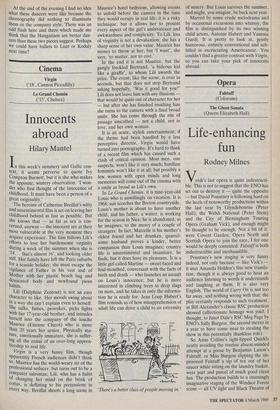Cinema
Virgin (`18', Cannon Piccadilly)
Innocents abroad
Hilary Mantel
In this week's summery and Gallic con- text, it seems perverse to quote Ivy
Compton Burnett, but it is she who makes the apposite, wintery observation. 'I won- der who first thought of the innocence of childhood. It must have been a person of a great originality.' The heroine of Catherine Breillat's witty and unsentimental film is set on leaving her childhood behind as fast as possible. But she knows that — as far as sex is con- cerned, anyway — the innocent are at their most vulnerable at the very moment they acquire experience. The film follows Lili's efforts to lose her burdensome virginity during a week of the summer when she is `14... that's almost 16', and looking older still. Her family have left the Paris suburbs for a seaside holiday; she must escape the vigilance of Father in his vest and of Mother with her plastic beach bag and dessicated body and newfound pious habits.
Lili (Delphine Zentout), is not an easy character to like. Her moods swing about in a way she can't explain even to herself. She sulks, fumes, provokes, picks fights with her 17-year-old brother, and intrudes herself into the company of the louche Maurice (Etienne Chicot) who is more than 20 years her senior. Physically ma- ture, emotionally immature, she is suffer- ing all the ennui of an over-long appren- ticeship to real life.
Virgin is a very funny film, though apparently French audiences didn't think so. Maurice has the world-weary air of the professional seducer, but turns out to be a computer salesman; Lili, who has a habit of changing her mind on the brink of coitus, is deflating to his pretensions in every way. Breillat shoots a long scene in
Maurice's hotel bedroom, allowing events to unfold before the camera in the time they would occupy in real life; it is a risky technique, but it allows her to present every aspect of the girl's ambivalence and awkwardness and complexity. To Lili, loss of virginity is not a devaluation; she has a sharp sense of her own value. Maurice has money to throw at her; but 'I want', she says, `to matter, not to cost.' In the end it is not Maurice, but the gangly freckled Bertrand, 'a hideous kid like a giraffe', to whom Lili awards the prize. The event, like the scene, is over in seconds, but that does not stop Bertrand asking hopefully, Was it good for you?' Lili does not leave him with any illusions that would be quite out of character for her — but after she has finished insulting him she turns to the camera with a final broad smile. She has come through the rite of passage unscathed — not a child, not in love, and her own woman.
It is an acute, stylish entertainment; if the theine had been handled by a less perceptive director, Virgin would have turned into pornography. It's hard to think of a recent film which has caused such a clash of critical opinion. Mbst men, one suspects, won't like it very much; hardline feminists won't like it at all; but possibly a few women with open minds and long memories will come out of the cinema with a smile as broad as Lili's own.
In Le Grand Chemin, it is nine-year-old Louis who is unwillingly on vacation. It is 1968; sun scorches the Breton countryside. Louis's mother is about to have another child, and his father, a waiter, is working for the season in Nice; he is abandoned, as he imagines, to the mercy of a couple of strangers. In fact, Marcelle is his mother's oldest friend and her drunken, quarrel- some husband proves a kinder, better companion than Louis imagines; country life is unsentimental and insanitary, he finds, but it does have its pleasures. It is a little girl called Martine — sweet-faced and foul-mouthed, conversant with the facts of birth and death — who launches an assault on Louis's innocence; but he is more interested in climbing trees to drop slugs on nuns, and he takes in only the informa- tion he is ready for. Jean Loup Hubert's film reminds us of how misapprehension of adult life can drive a child to an extremity `There's a better class of people moving in.' of misery. But Louis survives the summer, and might, you imagine, be back next year.
Marred by some crude melodrama and by occasional excursions into whimsy, the film is distinguished by its two winning child actors, Antoine Hubert and Vanessa Guedj. It is pretty to look at, gently humorous, entirely conventional and sub- titled in excruciating Americanese. You couldn't find a greater contrast with Virgin, so you can take your pick of innocents abroad.
















































 Previous page
Previous page